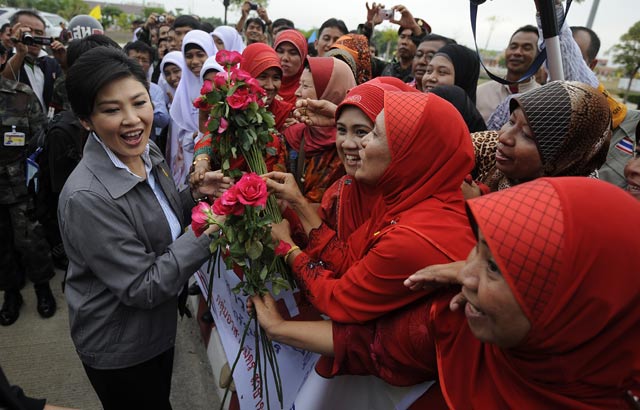Despite a signed agreement that paves the way for peace in Thailand, a ceasefire could be a long way off
by James Blair
The move was ambitious, but it ended in spectacular failure. One night in February, in the southern province of Narathiwat, a group of militants disguised as Thai soldiers attempted to slip onto a military base under the cover of darkness. Battle-hardened Marines, who had already received intelligence of a possible attack, cradled their assault rifles in the shadows. In the vicious battle that erupted no quarter was asked or given. As the sun rose on the lush, green landscape surrounding the base, the victorious Marines mopped up the blood and counted 16 dead militants.

Much love: Thai Prime Minister Yingluck Shinawatra receives flowers from Thai Muslim women during a visit to the southern province of Narathiwat
Violence has become a way of life in southern Thailand, where militant groups of Muslim Malays, who make up the majority of the population in the region, are seeking greater autonomy from Buddhist Thailand. Militants trace their claims for autonomy back to the 13th century and the sultanate of Pattani, which was a Malay state that occupied the same area. After the region was divided between British Malaya and Thailand (then Siam) in 1909, there has been a succession of ethnic Malay groups battling the Thai state.
Since violence flared up again in 2004, it has claimed over 5,300 lives. Currently over 60,000 Thai soldiers are deployed in the region to provide security against daily incidents that include bombings and drive-by shootings. A solution to the conflict has seemed far away for increasingly desperate Thai authorities.
This changed last month when the Thai government and a representative for one of the insurgent groups signed an agreement in Kuala Lumpur to begin peace negotiations that will be facilitated by Malaysia. Hassan Taib signed the agreement on behalf of the Barisan Revolusi Nasional (BRN). The BRN is believed to be the parent group of BRN-Coordinate, widely recognised as the largest and most active insurgent group in southern Thailand. Though whether this hierarchical relationship still exists is uncertain.
Malaysia looks set to repeat the role it played in facilitating an agreement to achieve peace in the southern Philippines, where separatist groups have long fought for an independent state. In October last year, Kuala Lumpur announced that Muslim militants from the region and the Philippine government had signed a framework agreement designed to pave a path toward peace.
Some analysts have cautioned against comparing the peace deal that Malaysia was able to facilitate in the Philippines with the possibility of peace talks in southern Thailand. Dr Zachary Abuza, an academic from Boston who specialises in Southeast Asian security, believes that the Milf, the main rebel group in the southern Philippines, was militarily outmatched by the Philippine army and that this is not the case in southern Thailand.
“Milf could not continue its fight,” he said. “They had every incentive to negotiate because every time they went back to fighting they lost. The pressure for them to cut a deal was quite substantial. The government had gotten stronger, their military capabilities had improved, they had assistance from the US, from Australia, the entire battlefield calculus had shifted to the Philippine government. Milf is a shadow of its former self.”
The conflict in southern Thailand, in contrast, had actually increased in intensity in recent years. “There are more IEDs (improvised explosive devices) in southern Thailand than any other country in the world other than Afghanistan and Iraq,” Abuza said. International Crisis Group released a report in December 2012 that concluded insurgent capabilities are outpacing state counter-measures, which are mired in complacency and political conflict.
Some observers have questioned the credibility of the expected peace talks.
“There is a question about whether Hassan Tahib is actually representative of some of the groups that are fighting on the ground,” said Virginie Andre, a research fellow at Monash University, during a recent interview on ABC Radio Australia. “I really have my own doubts about how much the BRN, and especially Mr Tahib, would have control over these particular groups.”
The conflict in southern Thailand is characterised by a fragmented insurgency that consists of a variety of groups which are content to operate in the shadows, and often their leadership structure is unknown. There is also a generational division between historic militants, who have ceased fighting and are often living in exile in Malaysia, and younger militants who are responsible for the current violence. Thai authorities must ensure they are negotiating with militants who control forces on the ground.
A day after peace talks were announced last month, two bombs ripped through Narathiwat province, injuring six people. If Thai authorities and militants agree to a ceasefire in the coming months, and it holds, then this could indicate that Hassan Taib is a bona fide representative of a group that controls active militants and that further talks are likely to yield results.
Hunting for harmony
Despite a signed agreement that paves the way for peace in Thailand, a ceasefire could be a long way off
